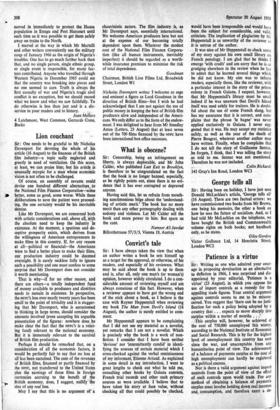Lion couchant
Sir : One needs to be grateful to Mr Nicholas Davenport for devoting the whole of his article (16 August) to the finances of the British film industry—a topic sadly neglected and greatly in need of ventilation. On this score, at least, we can praise him; but his article is unusually myopic for a man whose economic vision is not often to be challenged.
Of course, an assembly of savants could devise one hundred different alternatives to the National Film Finance Corporation—some better, some as good, some worse. While these deliberations to save the patient were proceed- ing, the one certainty would be his inevitable demise.
Like Mr Davenport, we are concerned both with artistic considerations and, above all, with the absolute need to keep the industry in existence. At the moment, a spurious and de- ceptive prosperity exists, which derives from the willingness of American entrepreneurs to make films in this country. If, for any reason at all—political or financial—the Americans were to find a better place to make their films, our production industry could be doomed overnight. It is surely reckless folly to ignore such a possibility and one must confess to some surprise that Mr Davenport does not consider it worth mentioning.
That is why—if for no other reason, and there are others—a totally independent fund of money available to producers and directors needs to remain in existence. In perspective, the NFFC's loss over nearly twenty years has been small to the point of triviality and it is stagger- ing that Mr Davenport, who is accustomed to thinking in large terms, should consider the amounts involved (even accepting his arguable presentation of the figures : nowhere does he make clear the fact that the NFFC's is a rotat- ing fund) relevant to the national economy. But it is immensely relevant to the survival of British film production.
Perhaps it should be remarked that, on a consideration of all the economic factors, it would be perfectly fair to say that no loss at all has been sustained. The sum of the revenues of British films, financed or partly financed by the NFFC, not transferred to the United States plus the earnings of those films in foreign currencies accruing to the benefit of the British economy, does, I suggest, nullify the idea of any real loss.
May I say that this is no argument of a
chauvinistic nature. The film industry is, as Mr Davenport says, essentially international. We welcome American producers here but not at the expense of our becoming totally dependent upon them. Whatever the modest cost of the National Film Finance Corpora- tion (like all human instruments, inevitably imperfect) it should be regarded as a worth- while insurance premium to minimise the risk of total dependence.
Goodman Chairman, British Lion Films Ltd, Broadwick Street, London WI
Nicholas Davenport writes: I welcome so sage and eminent a figure as Lord Goodman in the direction of British films—but I wish he had acknowledged that I am not against the use of public money in keeping the best of British film producers alive and independent of the Ameri- cans. We only differ as to the form of the endow- ment. I was delighted to hear from Mi Smedley Aston (Letters, 23 August) that at least seven out of the 700 films financed by the NFFC have been international box office successes.


































 Previous page
Previous page